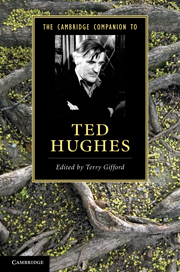Book contents
- Frontmatter
- Contents
- Acknowledgements
- Contributors
- Note on Referencing and Abbreviations
- Chronology
- Introduction
- 1 The problem of biography
- 2 The debates about Hughes
- 3 Hughes and animals
- 4 Ted Hughes and Sylvia Plath
- 5 The anthropologist’s uses of myth
- 6 Hughes’s social ecology
- 7 Hughes and feminism
- 8 Hughes and the classics
- 9 Hughes as prose writer
- 10 Hughes on Shakespeare
- 11 Class, war and the Laureateship
- 12 Hughes and his critics
- Guide to further reading
- Index
4 - Ted Hughes and Sylvia Plath
Published online by Cambridge University Press: 28 July 2011
- Frontmatter
- Contents
- Acknowledgements
- Contributors
- Note on Referencing and Abbreviations
- Chronology
- Introduction
- 1 The problem of biography
- 2 The debates about Hughes
- 3 Hughes and animals
- 4 Ted Hughes and Sylvia Plath
- 5 The anthropologist’s uses of myth
- 6 Hughes’s social ecology
- 7 Hughes and feminism
- 8 Hughes and the classics
- 9 Hughes as prose writer
- 10 Hughes on Shakespeare
- 11 Class, war and the Laureateship
- 12 Hughes and his critics
- Guide to further reading
- Index
Summary
When Ted Hughes and Sylvia Plath first met in 1956 both were already, in Hughes’s words, ‘curious’ about the other. Both had acquaintances in common and both were publishing poetry in the various literary magazines that proliferated in Cambridge at this time. Two early Plath poems, ‘Epitaph in Three Parts’ and ‘“Three Caryatids Without a Portico” by Hugh Robus. A Study in Sculptural Dimensions’, the first that she published in England, appeared in the Winter 1956 issue of Chequer. Two years earlier, Hughes had published some of his poems, ‘The Jaguar’ and ‘Casualty’, in the same magazine. Several of his friends were frequent contributors. Plath’s poems were mocked in a ‘broadsheet of literary comment’ which Hughes’s ‘poetic gang’ (his words) produced. And although this particular review was penned by Hughes’s friend Daniel Huws, it is clear from the former’s subsequent recollection of events that this was to some degree a collaborative enterprise with Huws acting, at least implicitly, on behalf of ‘our group’.
- Type
- Chapter
- Information
- The Cambridge Companion to Ted Hughes , pp. 53 - 66Publisher: Cambridge University PressPrint publication year: 2011
- 2
- Cited by

